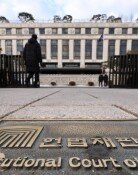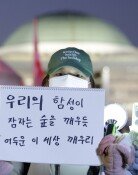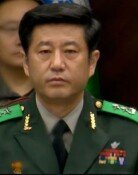Will Prosecutors Publicize Who Talked About What and Where?
Will Prosecutors Publicize Who Talked About What and Where?
Posted August. 01, 2005 06:08,
Prosecutor General Declares War-
Clause One, Article 16 of the Telecommunications Security Protection Act prescribes that those who disclose or illegally leak wiretapped conversations shall be subject to a harsh penalty. Under the act, they, if convicted, shall be sentenced up to 10 years in prison and suspended for less than five years. They wont be able to get away with it just by paying fines.
The investigation will inevitably involve finding out the contents of 274 wiretapping tapes which prosecutors confiscated at the house of Gong Un-young (58), the former manager of the Mirim Team (a specialized wiretapping team) of the Agency for National Security Planning (the current National Intelligence Service). Every single act of wiretapping constitutes a separate crime (or substantial concurrence in legal terms), so persecutors need to reveal what was wiretapped, where, and how.
The investigative prosecutor is supposed to report developments back to the chain of command. At the top of the chain is the prosecutor general. But this case is different. Under the Telecommunications Security Protection Act, all the reports fall into the category of disclosure and divulgence.
But Article 29 of the penal code stipulates that acts associated with job responsibility should not be punished for, and are regarded as justifiable acts on the grounds of justification. Reports on the investigation is one of them.
Despite this fact, Prosecutor General Kim declared that he refused to be briefed on the case.
His stance indicates how prosecutors will lead the investigation from now on. Now that the prosecutor general made clear that he doesnt want to know about the case, a thorough investigation will be conducted with divulgence and disclosure strictly under control. His message is clear; I gave up my right to know. So no one dares to know. This remark can be viewed as the prosecutor generals grave declaration of war.
Wiretapped Conversations Should Not Be Disclosed-
Public attention is focusing on who the influential figures mentioned in those tapes talked about.
But as the prosecutor general announced that he would not be briefed on the case, there is zero possibility that the prosecutor would disclose the conversation. Of course, we cant rule out the possibility that some of the wiretapped conversation could be leaked out to the public due to mistakes on the part of prosecutors or secret media reporting.
Will the Eavesdropping Targets Be Revealed?-
It could be controversial to disclose those who were illegally wiretapped.
Criminal procedure stipulates that the prosecution shall specify facts, including time, venue and the means of a particular crime, in its indictment. Thats why the prosecution specified what national secrets novelist Hwang Seog-young divulged when it indicted him on charges of divulgence of national secrets under the National Security Law in 1993.
Therefore, in the indictment phase, the identity of those who were wiretapped can be disclosed for the purpose of specifying acts of crime. For example, the prosecutor can write the indictment, The accused illegally eavesdropped on the conversation A and B had in a restaurant of hotel C on D (month), E (date). The prosecution is already struggling with this issue.
But not a few prosecutors are opposed to the idea. One senior prosecutor said Disclosing the identity of a victim in a sexual violence case is equivalent to victimizing the victim once again, adding This case is similar in this regard. Judicial precedents also acknowledge, Not specifying facts in the indictment does not establish illegality under special circumstances.
Venue Could Be Revealed-
The venue is not the subject that they talked about, so there is the possibility that where the conversations took place could be made public. One prosecutor-turned-lawyer said, We understand that even though we are not supposed to open Pandoras box, we can disclose where we got that box. So, it could be revealed where the leaders in our society have their intimate conversations.
As a result, among the who talked about what and where elements which spark the publics curiosity, it is very likely that the where part can be revealed. But there is little chance of disclosure for who, and a very remote chance for the disclosure of what.
But at the same time, we cant rule out the possibility that all of these will be divulged. After all, prosecutors are human beings. No one can say with confidence that Pandoras box will be closed forever and completely.
Jin-Young Hwang buddy@donga.com
Headline News
- Pres. Yoon refuses impeachment documents for a week
- Debate over Lee’s participation causes friction in government consultative body
- Food and dining prices could increase en masse next year
- Foreign couple borrowed over $2 million to buy a Seoul house
- One-third of Japanese companies keep workers employed until 70







